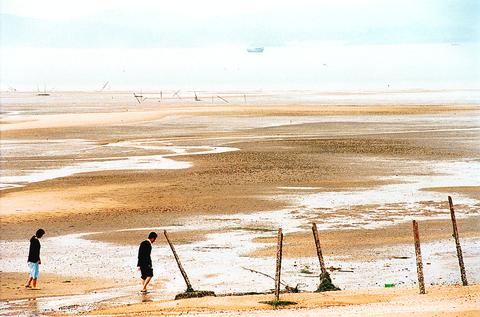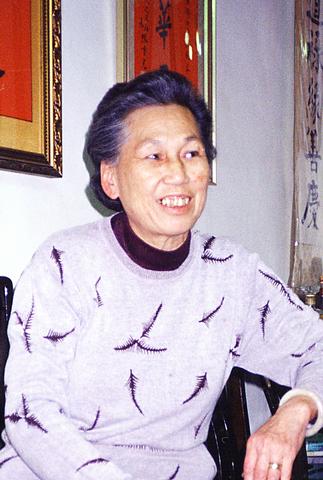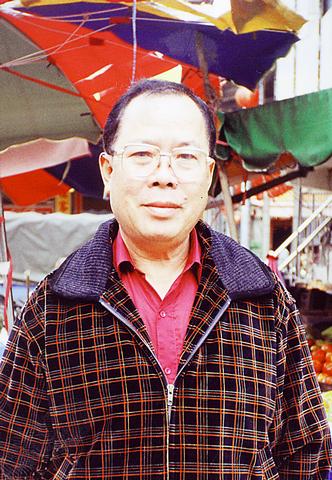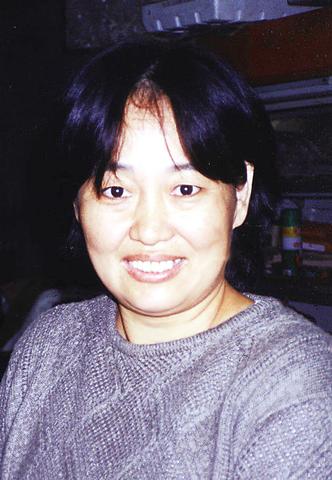The major goal of the "small three links" (
"It takes longer to get from Xiamen to Kinmen's Liaolo port (料羅灣) than it does to get to the beach. Therefore, we're not sure whether Chinese tradesmen will follow the route we've mapped out for them or just keep trading at the shoreline," chief of Kinmen Harbor Bureau's engineering department (金門港務處工務課) Hsu Cheng-fang (許正芳) told the Taipei Times, warning that trading along the shoreline would still be illegal even after the policy is implemented on Jan 1.
As far as Xiamen tradesmen are concerned, small-amount trade has been a staple means of making a living while, to most of Kinmen's ordinary residents, it has made for an interesting market to visit.

PHOTO: CHEN CHENG-CHANG, TAIPEI TIMES
"It's fun ... kind of like an exercise for us," said local resident A-mei (阿美), who added that she and her friends chase after bargains in the black market mostly out of curiosity.
When coastal police are not around, the so-called "sell and run" (賣了就跑) market often attracts hundreds of cross-strait transactions on the beaches of Kinmen.
However, when the coastal police are watching, it could appear to be nothing but people scattered on the seashore eager to make contact.

PHOTO: LIBERTY TIMES
Not surprisingly, the police are often looked upon as the enemy.
"You sometimes hear rumors of police beating up Chinese tradesmen, which can generate sympathy from Kinmen residents to their fellow Chinese across the strait, as well as hostility towards our own police," according to Chen Ching-hwang (陳清煌), director of KMT Legislator Chen Ching-pao's (陳清寶) Kinmen office.
"We Kinmen residents actually identify more with Chinese than Taiwanese," said vice president of the Kinmen County Council Hsu Yu-chad (

PHOTO: LIBERTY TIMES
Batches of inexpensive goods have long been illegally shipped by Chinese fishermen to Kinmen wholesalers.
Chinese boats would sail in with the rising tide -- chongshan (
Chinese tradesmen began anchoring their boats loaded with a variety of goods in the open sea, then would daringly ride a sampan made of thick polystyrene boards covered with waterproof plastic in order to go ashore. Goods, such as vegetables, seafood and rice, were presented on the sampan for purchase -- a box of 15 apples for only NT$125, an eel for less than NT$200, the prices were almost four times cheaper than those found on Kinmen.

PHOTO: LIBERTY TIMES
The sale of Chinese goods has become so lucrative that tradesmen from Xiamen would rather risk arrest than give up the market.
"When they are caught by the policy, all their goods are confiscated and they're detained for at least a half-day-long interrogation ... but they don't seem to care," said Chen Kin-lu (陳金祿), the owner of a Chinese medicine shop. He said that the tradesmen would sometimes scatter their goods on the beach to deter the police from arresting them.
"Bystanders might sometimes be rewarded by the police with seawater-soaked goods if they failed to catch the traders," Chen added.

PHOTO: LIBERTY TIMES
Chinese goods may cheap, but quality is a different matter.
"Epidemic diseases may be transmitted from Chinese produce to Kinmen," Hsu said, citing the recent cases of foot-and-mouth disease in Kinmen.
"Without a market price mechanism, you don't really know if what you bought is actually a bargain or if you were ripped off," Chen Ching-hwang said.

PHOTO: LIBERTY TIMES
"In a market like that, you may pay for a box of useless stones and you still don't know who to argue with," A-mei said jokingly.
But others differed, saying that Chinese tradesmen cherished the market such that they would feel obliged to provide better-quality goods to their customers on Kinmen.Miss Yang (楊小姐)
Grocery store ownerI am not worried that the policy will make it easier for men to have mistresses [in China]. Why? Because wives will be able to track their husbands and follow them to Xiamen, if they dare to have mistresses there. If men can go, so can women. Therefore, I don't think the policy will have a negative impact in this regard. I think people will go there initially out of curiosity and then the fad will gradually fade.

PHOTO: LIBERTY TIMES
Sun Ping-shu (孫炳樹)
Retired
Age: 63There will be more disadvantages than advantages once the direct links take effect. There may be a disruption in social order and a rise in crime. It might have a negative impact on local agriculture as well. There may be a decrease in demand for local fruits and vegetables because those coming from China are so cheap. I don't think residents from Xiamen will offset that -- they simply don't have money to spend.Tsai Bi-feng (蔡碧鳳)

PHOTO: LIBERTY TIMES
Housekeeper
Age: 70A lot of Kinmen residents are putting iron gratings on their doors and windows. In Kinmen, we used to leave our doors open when we were busy with housework and we could leave our doors unlocked even after we went to bed at night. I am worried that some poor Chinese people may commit robberies. The policy certainly benefits the iron grating businesses.
Yang Hsiu-bai (楊秀貝)

PHOTO: LIBERTY TIMES
Fruit store owner
Age: 40Some tourists may prefer to buy their fruit from China. However, the locals with higher living standards, civil servants for example, may choose not to buy any. They fear that China's fruit, not having been inspected by sanitation and anti-epidemic bureaus first, may contain preservatives and who knows what else. But their fruit is definitely cheaper. In fact, it's almost half as cheap as the fruit grown in Taiwan.
Hsu, Chi-yung (
Former Kincheng township magistrate
Age: 52I am not certain about the policy's prospects since there was no direct cross-strait negotiation conducted beforehand. I also wonder what Chinese laborers will be up to during their stay in Kinmen since they can enter here legally now. There may be a rise in prostitution in Kinmen, whereas now most people enjoy living a simple life.
Chen Ching-hwang 陳清煌
Director of KMT Legislator Chen Ching-pao's (張清寶)Kinmen office
Age: 38 We are looking forward to developing Kinmen into a `duty-free trade center (
Chen Kin-lu (陳金祿)
Traditional Chinese medicine shop owner
Age: 70It doesn't seem as though the policy will affect our daily lives. However, if we are allowed to import Chinese medicine directly from Xiamen, we will take advantage of the cheaper source. But, if the government intends to collect taxes on imported Chinese medicine, it will not help our business. I hope the government lists it as a tax-free item but it looks as though government officials are still undecided.
Tung Shui-yin (董水銀)
Fish shop owner
Age: 60
[Commodities from China] are cheaper and of greater variety. This increased competition will make it very difficult for us to run our businesses. And I don't mean just fish. Any number of goods from China fit this description. [Local products] will be harder to sell! I don't think the policy will help Kinmen in any way.

The Central Election Commission has amended election and recall regulations to require elected office candidates to provide proof that they have no Chinese citizenship, a Cabinet report said. The commission on Oct. 29 last year revised the Measures for the Permission of Family-based Residence, Long-term Residence and Settlement of People from the Mainland Area in the Taiwan Area (大陸地區人民在台灣地區依親居留長期居留或定居許可辦法), the Executive Yuan said in a report it submitted to the legislature for review. The revision requires Chinese citizens applying for permanent residency to submit notarial documents showing that they have lost their Chinese household record and have renounced — or have never

A magnitude 5.6 earthquake struck off the coast of Yilan County at 12:37pm today, with clear shaking felt across much of northern Taiwan. There were no immediate reports of damage. The epicenter of the quake was 16.9km east-southeast of Yilan County Hall offshore at a depth of 66.8km, Central Weather Administration (CWA) data showed. The maximum intensity registered at a 4 in Yilan County’s Nanao Township (南澳) on Taiwan’s seven-tier scale. Other parts of Yilan, as well as certain areas of Hualien County, Taipei, New Taipei City, Taoyuan, Hsinchu County, Taichung and Miaoli County, recorded intensities of 3. Residents of Yilan County and Taipei received

Taiwan has secured another breakthrough in fruit exports, with jujubes, dragon fruit and lychees approved for shipment to the EU, the Ministry of Agriculture said yesterday. The Animal and Plant Health Inspection Agency on Thursday received formal notification of the approval from the EU, the ministry said, adding that the decision was expected to expand Taiwanese fruit producers’ access to high-end European markets. Taiwan exported 126 tonnes of lychees last year, valued at US$1.48 million, with Japan accounting for 102 tonnes. Other export destinations included New Zealand, Hong Kong, the US and Australia, ministry data showed. Jujube exports totaled 103 tonnes, valued at

BIG SPENDERS: Foreign investors bought the most Taiwan equities since 2005, signaling confidence that an AI boom would continue to benefit chipmakers Taiwan Semiconductor Manufacturing Co’s (TSMC, 台積電) market capitalization swelled to US$2 trillion for the first time following a 4.25 percent rally in its American depositary receipts (ADR) overnight, putting the world’s biggest contract chipmaker sixth on the list of the world’s biggest companies by market capitalization, just behind Amazon.com Inc. The site CompaniesMarketcap.com ranked TSMC ahead of Saudi Aramco and Meta Platforms Inc. The Taiwanese company’s ADRs on Tuesday surged to US$385.75 on the New York Stock Exchange, as strong demand for artificial intelligence (AI) applications led to chip supply constraints and boost revenue growth to record-breaking levels. Each TSMC ADR represents